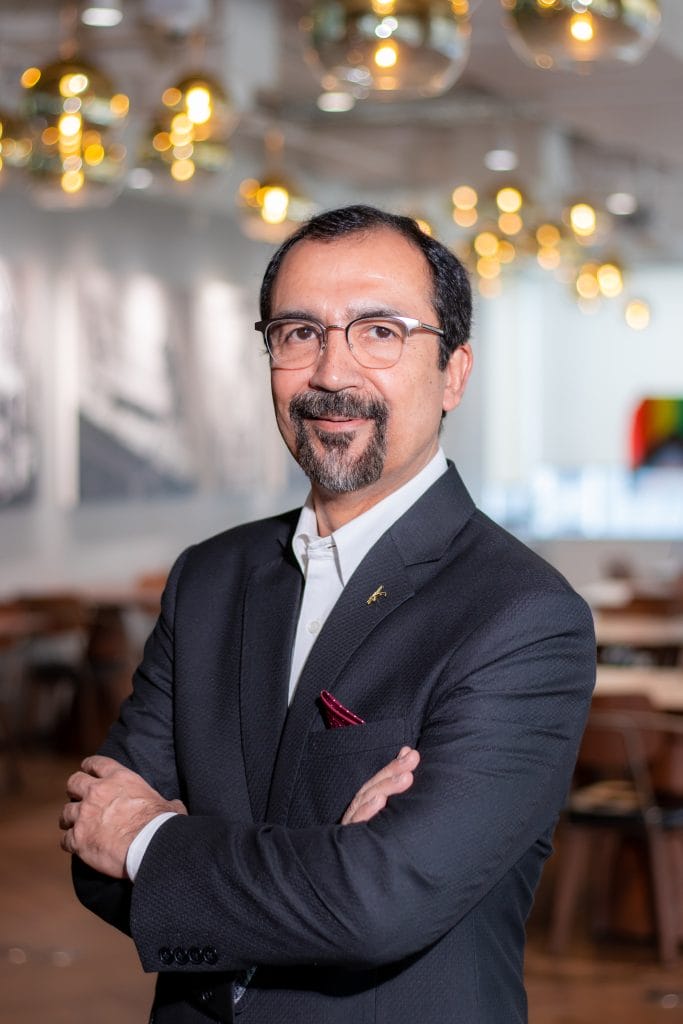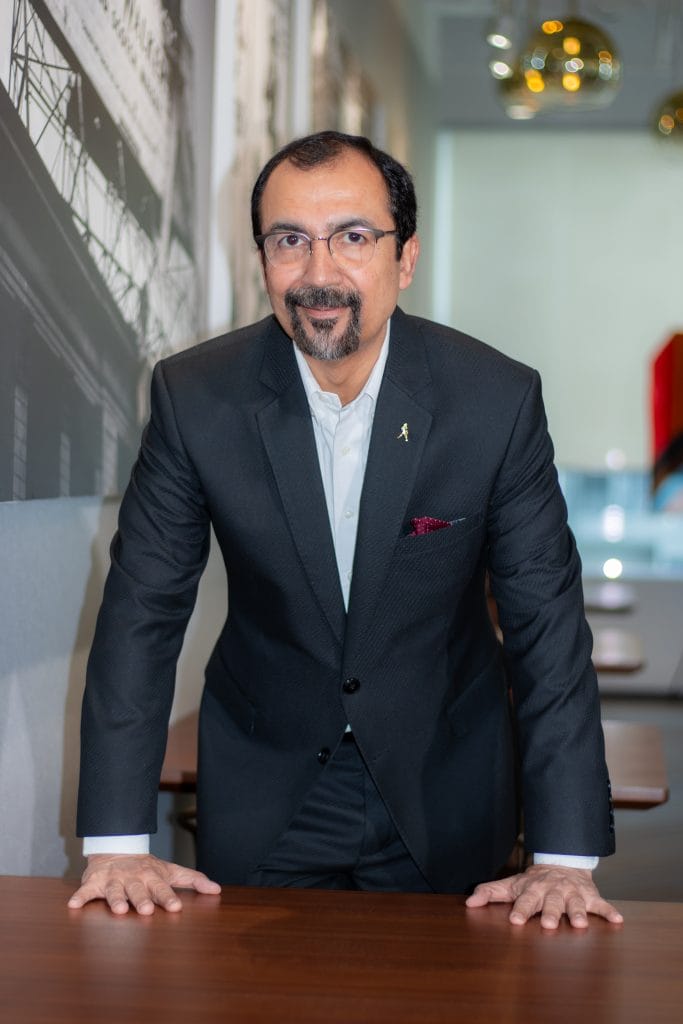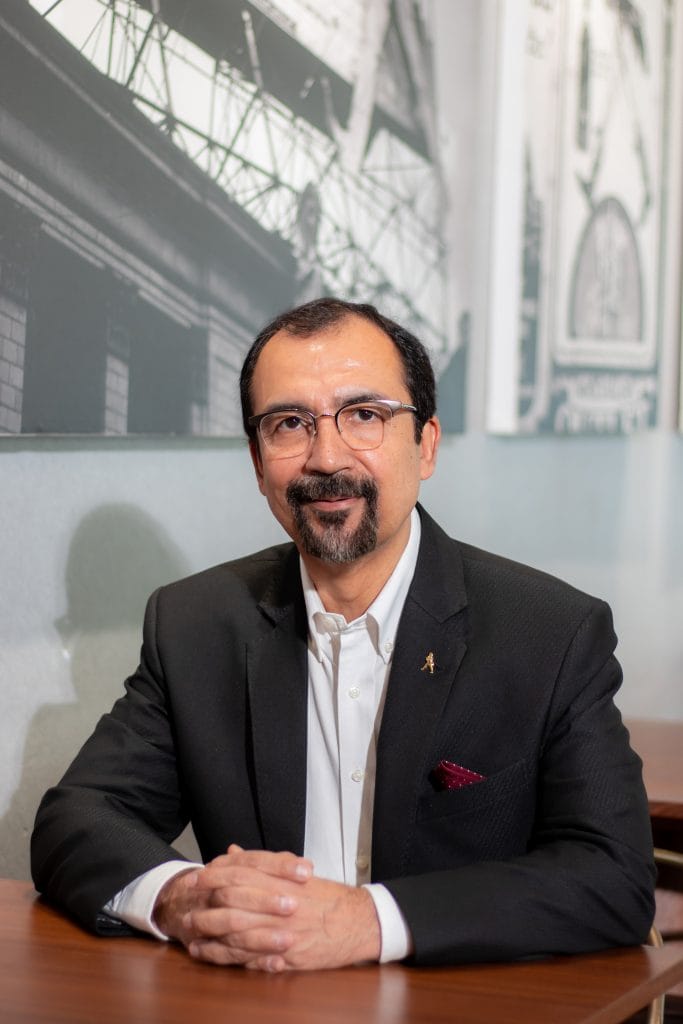Here’s a toast to the director
By Mahmood Hossain
Seneca, the Stoic philosopher of Ancient Rome, once said, “Travel and change of place impart new vigour to the mind.” These words might have struck a chord with Puneet Narang, who, during our conversation, realised that this had been one of the key factors behind his drive and ambitions. In other words, after spending the first couple of decades of his life in New Delhi, he’d decided to wisely step outside his comfortable surroundings, embrace the world and its countless alien encounters, and embark on a journey through a road less travelled of foreign cultures and customs.
This was a man who’d challenged himself, driven by the winds of passion and the natural curiosity of what the world had to offer. Before becoming the Managing Director of Diageo Moët Hennessy Thailand, Puneet Narang ventured out into several countries in the past 20 years, meeting new people, making new friends, and creating temporary homes; the opposite of the first 20 years of his life. Through each year and step of the way, he was staunchly supported by his wonderful wife Nalini, which he makes sure to emphasise in our discussion, as he is fondly reminded of her unwavering championing of his professional pursuits. It is, after all, what brought him to Thailand.
You’ve skyrocketed into a very desirable role at such a prestigious company. Given your background, could you describe your transition between not only countries, but different industries?
Most of my career, before shifting to general management, has been around marketing. Through various industries, I’ve found myself in the FMCG (Fast-Moving Consumer Goods) space, working in companies like Reckitt and Mondeléz and other interesting stints in other industries. For example, I launched Lacoste as Head of Marketing in India, and about five years ago, I helped to open a new bank called Jana Small Finance Bank in India. I largely consider myself an FMCG guy, but I’ve taken those skills and learnings into my
other roles. It’s all about being open to challenges.
Fortunately, I’ve always loved my job, no matter where I’ve found myself. It’s not easy for everyone, and we all have our frustrations. I have them too, but balancing becomes easier when you focus on what you can control. And the outcome becomes more rewarding.
Was that one of the main reasons for your transition from a marketing position to a general managerial role?
I saw it as a natural progression in one’s career. When most senior leaders reach the functional headspace, they want to get into general management, running the whole business. And there are benefits coming from a marketing background, especially in the FMCG environment. Marketing allowed me to be involved with nearly every department within the company; this gave me the opportunity to dabble in every other function of the business.
When I first moved into general management, there were different barriers to overcome, of course. The most challenging part was leading other functions without being an expert on them. I made a conscious decision not to only focus on my usual marketing functions; I had to learn the ropes in other departments. Nevertheless, I’m not an expert in every part of a company, and never will be. I rely a lot on my team and the functional heads, and I am blessed with a fantastic team here in Thailand. Not only has it been a pleasure working alongside them, I’ve learned much more from them. In turn, that has allowed both parties to excel in their duties within the organisation.
It must be a relief to have a solid team on board here in Thailand. How does this region compare to others regarding work culture and rewarding moments? I find working in Asia incredibly rewarding. I’ve worked in Australia, the UK, Europe, and even Turkey, before returning to the continent. Working in Asia is very exciting; its atmosphere is always buzzing. It’s easy to see the passion and drive of these growing economies backed by young populations, and they are always growing and changing. You can see the difference for yourself in developing parts of the continent. You can take a 10-year absence from Asia and see the drastic change, whereas other parts of the world often stay the same.
I’ve been working in Thailand for a little over a year, and from the Diageo Moët Hennessy perspective, the work that has been happening is par excellence. For instance, take one of the company’s biggest brands, Johnnie Walker, which has been a shining example of success since its introduction to the country 99 years ago. We’re just a year shy from celebrating its century mark; the organisation is also the largest international spirits company in the country. For the past 23 years, it has been awarded the most admired brand in the spirits category from BrandAge as a testament to its impact on the industry. I was lucky to have been present to receive the award on behalf of the company this time around.
With rewards, there are sacrifices and challenges when taking on such an important role. How do you balance your professional and personal life, and what are the more challenging aspects?
Work-life balance is a buzz worthy term that is often talked in the corporate world. It’s not easy to find the perfect work-life balance, but one eventually learns how to manage both professional and personal affairs. There is no simple answer or magic bullet that solves everything. However, I love my job, which makes it easy. If you don’t treat it as a job, and take it as a passion, you are not affected by the number of hours that may seem gruelling to others. There are many exceptional days when extra hours are necessary, even on the weekends. But I have always made a conscious effort to never let my job come in the way of my personal life.
The biggest challenge, as I’m sure it was for most people, was the pandemic. The business of alcoholic beverages is linked to hospitality and tourism, so it obviously affected the way we conducted business at Diageo. But with the help of my leadership team, we worked hard to reclaim the position the company had pre-pandemic, gained market share, and continue to deliver impactful results. Kudos to my brilliant team, who despite all odds, deliver fantastic results.
Unexpected challenges are inevitable, but what about the ones that have already been established? How does Diageo navigate through Thailand’s restrictions behind advertising alcohol, while maintaining brand exposure?
That’s an excellent question because the Thailand market is unique in that way. As a company worldwide, we always respect local regulations. However, we are fortunate to have brands like Johnnie Walker, Smirnoff, Tanqueray, you name it. These well-established and popular brands are already loved by consumers, which creates a good consumer pull. We have a strong presence in retail stores, hotels, restaurants, and nightclubs, to ensure our brands are accessible to our consumers.
Moreover, we are proactive in working closely with the ministries, and through our engagement with the Thai Alcohol Beverage Business Association (TABBA), we make sure our industry issues are understood, and the government can support our industry. Afterall, we are key contributors to the hospitality industry and tourism, which is in the government’s interest to drive as well. We are always willing to work with the government in advancing the industry in a responsible manner. For example, we recently worked with the Department of Land Transport to launch a “Don’t Drink and Drive” campaign. This campaign is a great example of the industry and government coming together to encourage responsible drinking, which is of mutual interest.
It seems like you are aligned with the company’s cultural values, do they coincide with your own?
Absolutely. I believe, for any employee or anyone in a leadership role, if you’re not aligned with the company’s values, you’re probably in the wrong workplace. I have a strong connection with how the company carries itself. That’s probably why I feel at ease at Diageo and in the position that I am in; I’m not trying to be something different or go against the company’s culture. In fact, we encourage our team to bring their true selves to work. Whether you talk about inclusion and diversity, gender balance, or you are a part of the LGBQTIA+ community, we want people to be themselves. And Diageo adopts this approach not only in Thailand but worldwide.
Which segues into our next inquiry about diversity. The company recently appointed Debra Crew as the new CEO of Diageo. How critical is it to maintain diversity throughout its leadership in order for Diageo to grow and succeed?
I think those days of wondering if the company is accelerating its diversity are over. There has been enough research and data that suggest a diverse workplace is significantly better for business. This also happens to be one of our core pillars. There is a global programme by the company called Society 2030: Spirit of Progress. The three pillars consist of championing inclusion and diversity, promoting responsible and positive drinking, and grain-to-glass sustainability. Within it, we have clear global targets to be delivered by 2030, such as being net-carbon neutral and having a 50/50 gender-balanced workforce. In Thailand, we are proud that our leadership team in particular is over 50 percent of women already.
As a company, we are proud to have Debra Crew, an accomplished woman leading a Fortune 500 company like Diageo. This serves as inspiration and motivation for all women in the organisation who aspire to be in leadership positions. As a father of two daughters, I feel absolutely thrilled to witness and be a part of these achievements and changes. It will be a brighter future when we can uphold an environment that is based on equality and equity, which is vastly different from when we were growing up. We continue to build upon our inclusion and diversity objectives throughout our organisation globally, not just in Thailand.
Expanding on the role of leadership, what do you believe are the key factors of becoming a good leader?
First, have a vision, or foresight – think bigger picture. Second, be authentic. This generation’s workforce expects their leaders to be honest and authentic. Next, empower your team; a leader cannot do everything by themselves. Trust your team and their abilities to follow through with plans. This gives birth to team development, and you are only as good as your team. It’s simple: if you cannot help your team improve, you will cease to grow and better yourself.
This reminded me of a saying I heard some time back, which rings true for any leadership position. Paraphrased: “when you reach the top floor, you have the moral responsibility to send the elevator down to bring the other deserving talent to the top.” There are plenty of other factors that make a great leader, but for me, these stand out most.
“A rising tide lifts all boats,” indeed. This, among other important aspects, must be a driving force behind your ambitions. What continues to spur your enthusiasm after all these years?
It goes back to my purpose. I have always believed in making everyone’s ‘tomorrow’ better than today. In other words, no matter what I am involved in, be it with family or colleagues, I want to leave a positive lasting impact on their lives and our surroundings. I still have the hunger, the drive to continuously improve things around me. I don’t believe we ever stop growing, so I am always eager to learn and engage. No matter which country, company, or industry, I look forward to Monday morning.
Is your passion fuelled partly by your natural excitement of being somewhere new and taking on a different role?
That’s a very good point. The moment you are thrown into a new country, aside from starting a new job, you are forced to adapt and learn an entirely new culture. That experience is priceless because I firmly believe after the first few years in a job, you tend to slip into cruise mode. Your scope of growth hits a low ceiling. Now that you’ve mentioned it, that could be one of the reasons that has propelled me to where I am today.
Compare it to working out: doing the same exercises every day will not help you grow. The moment your trainer changes your routine is when you realise there are muscles you’ve never had and the growth accelerates. You can apply that to your professional career as well.
For those aspiring to achieve similar objectives as yours, what advice would you give them?
Step outside your comfort zone; I think that’s been the theme of our conversation. Second, do not be afraid of taking on new or big challenges. If you want to build up those career muscles, change things up. Thirdly, hunger is critical. Unless you have that drive in you, you won’t be successful.
Fourth, be humble. Humility is what helps you grow and leads you to success. In that process of growth, you are not doing things on your own. There are always people around you that you must rely on to succeed as a team. Empower your team and trust them, and have the humility to acknowledge that your team at times may know better than you. Not only does that keep your feet on the ground, but it also provides the necessary lessons that you need to learn.
Finally, keep an open mind. Go out, travel, and change your geography because you will learn more about yourself in the process. You will be better equipped to take on new challenges no matter where you go.









